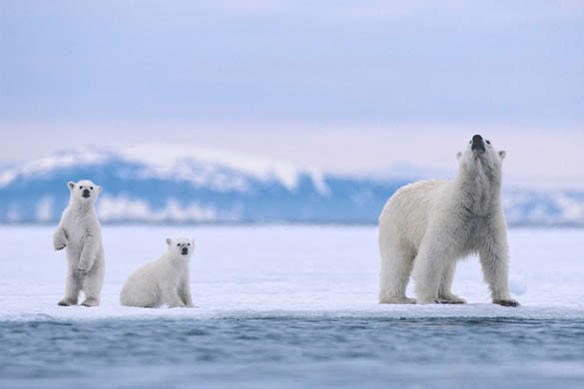
Photo source: ©© Jidanchaomian
Excerpts;
This year’s annual minimum of the Arctic sea ice tied with the second-lowest extent on record, a mere 1.6m sq miles, and badly affected polar bear populations that live and hunt on the north slope of Alaska, plus those that live on the ice floes in the Bering Sea…
Read Full Article; Guardian UK (09-29-2019)
Polar bears could become extinct faster than was feared, study says; Guardian UK (02-01-2018)
Soul-crushing’ video of starving polar bear exposes climate crisis, experts say; Guardian UK (12-08-2017)
Video footage captured in Canada’s Arctic has offered a devastating look at the impact climate change is having on polar bears in the region…
Busy Times at the World’s Largest Polar Bear Prison; The Atlantic (12-16-2016)
Sea ice has done some extremely odd things in 2016, as climate change is reshaping the Arctic faster than the rest of the planet. According to a new study, there’s a 71 percent chance that the global polar bear population will fall by over 30 percent in the next three decades. The only hope for the polar bear is to reduce carbon emissions, in the hope that the runaway pace of Arctic warming will eventually stabilize and reverse…
Polar Bears Shifting to Areas with More Sea Ice, Genetic Study Reveals; USGS (01-06-2015)
Scientists from around the Arctic have shown that recent generations of polar bears are moving towards areas with more persistent year-round sea ice…
Stranded Polar Bears at Kaktovik, Barter Island, Alaska; Guardian UK (11-21-2011)
Possibly hundreds of bears are becoming stranded on the coastal plain of North Alaska, because they cannot reach the retreating sea ice. Will Rose and Kajsa Sjölander, captured shots of stranded polar bears as part of “70° North”, a multimedia project documenting the impact of climate change and resources exploration in the Arctic…
Save The Arctic Video, Greenpeace; Greenpeace (09-01-2012)
Greenpeace, Jude Law, Radiohead and hundreds of thousands of people around the world are coming together to demand we save the Arctic from oil drilling, industrial fishing and militarization…









